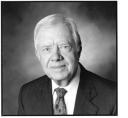 The beltway’s reaction to president Carter’s book ‘Palestine Piece Not Apartheid‘ was overly insulting to both him and the topic he was writing about. My knowledge of the Middle East and the Israeli-Palestinian conflict wasn’t half of what it is today after having finished the book yesterday. I highly recommend every American with an opinion on this, or the desire to learn about it from a Nobel Peace Prize winning author. President Jimmy Carter is deserving of the world’s gratitude, and in spite of the irrational response given initially to its publication, this book will go a long way towards one day achieving peace in the Middle East. Here is an excerpt (p. 208-210):
The beltway’s reaction to president Carter’s book ‘Palestine Piece Not Apartheid‘ was overly insulting to both him and the topic he was writing about. My knowledge of the Middle East and the Israeli-Palestinian conflict wasn’t half of what it is today after having finished the book yesterday. I highly recommend every American with an opinion on this, or the desire to learn about it from a Nobel Peace Prize winning author. President Jimmy Carter is deserving of the world’s gratitude, and in spite of the irrational response given initially to its publication, this book will go a long way towards one day achieving peace in the Middle East. Here is an excerpt (p. 208-210):
The overriding problem is that, for more than a quarter century, the actions of some Israeli leaders have been in direct conflict with the official policies of the United States, the international community, and their own negotiated agreements. Regardless of whether Palestinians had no formalized government, one headed by Yasir Arafat or Mahmoud Abbas, or one with Abbas as president and Hamas controlling the parliament and cabinet, Israel’s continued control and colonization of Palestinian land have been the primary obstacles to a comprehensive peace agreement in the Holy Land. In order to perpetuate the occupation, Israeli forces have deprived their unwilling subjects of basic human rights. No objective person could personally observe existing conditions in the West Bank and dispute these statements.
Two other interrelated factors have contributed to the perpetuation of violence and regional upheaval: the conditioning of illegal Israeli actions from a submissive White House and U.S. Congress during recent years, and the deference with which other international leaders permit this unofficial U.S. policy in the Middle East to prevail. There are constant and vehement political and media debates in Israel concerning its policies in the West Bank, but because of powerful political, economic, and religious forces in the United States, Israeli government decisions are rarely questioned or condemned, voices from Jerusalem dominate in our media, and most American citizens are unaware of circumstances in the occupied territories. At the same time, political leaders and news media in Europe are highly critical of Israeli policies, affecting public attitudes. Americans were surprised and angered by an opinion poll, published by the International Herald Tribune in October 2003, of 7,500 citizens in fifteen European nations, indicating that Israel was considered to be the top thread to world peace, ahead of North Korea, Iran, or Afghanistan.
The United States has used its U.N. Security Council veto more than forty times to block resolutions critical of Israel. Some of these vetoes have brought international discredit on the United States, and there is little doubt that the lack of a persistent effort to resolve the Palestinian issue is a major source of anti-American sentiment and terrorist activity throughout the Middle East and the Islamic world.
A new factor in the region is that the Palestinian election of January 2006 gave Hamas members control of the parliament and cabinet headed by the prime minister. Israel and the United States reacted by announcing a policy of isolating and destabilizing the new government. Elected officials are denied travel permits to participate in parliamentary affairs, denied travel permits to participate in parliamentary affairs, Gaza is effectively isolated, and every effort is made to block humanitarian funds to Palestinians, to prevent their right to employment or commercial trade, and to deny the access to Israel and the outside world.
In order to achieve its goals, Israel has decided to avoid any peace negotiations and to escape even the mild restraints of the United States by taking unilateral action called “convergence” or “realignment,” to carve out for itself the choice portions of the West Bank, leaving Palestinians destitute withing a small and fragmented remnant of their own land. The holding of almost 10,000 Arab prisoners and the destructive military response to the capture of three Israeli soldiers have aroused global concern about the hair-trigger possibility of a regional war being launched.

Hey Al, love your sportsblogging. We have some distance on some of the political stuff, but hey, I know what its like to hail from the land of the Kennedys.
Here’s a counter-article to your professed love of Jimmy Carter, from one of your friendly newspapers: http://www.washingtonpost.com/wp-dyn/content/article/2007/01/11/AR2007011101803.html
Something is rotten, and I don’t think its the 14 resigning members of the Carter Center.
Keep up the good work!